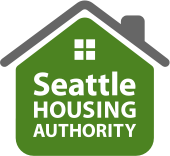Epstein Opportunity Center
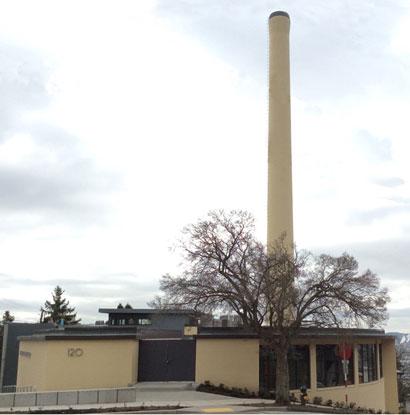
In April 2014, the former historic Yesler Steam Plant was reborn as the Epstein Opportunity Center, named for Jesse Epstein who served as the Seattle Housing Authority’s first executive director. The structure now houses programs and activities to serve residents of the Yesler neighborhood, including Yesler Head Start operated by Neighborhood House, Seattle Housing Authority’s Economic Opportunity Program and Youth Tutoring sponsored by Catholic Community Services. Two community rooms in the building are available as meeting space for neighborhood organizations, and often serve as the location for adult skills training classes.
The building is located at the corner of Eighth Avenue and Spruce Street. The original industrial plant was built in 1941 and provided coal-fired hot water heat to the neighborhood and other areas of the city until it was decommissioned in 1989. It then served as a landscaping and facilities shop for Harborview Medical Center.
In 2010, the building was designated as a Historic Landmark by the City of Seattle and, in 2011, the Seattle Housing Authority received funding to renovate the site. The Seattle Housing Authority carefully preserved the historic exterior and 142-foot stack. The adaptation as a community center added seismic upgrades, stairs, an elevator and restrooms. A second floor was added to the interior, more than doubling the floor space from 7,500 to 16,000 square feet. Where coal trucks used to be accommodated on the roof, a play area was added for the Head Start program.
First Hill Streetcar
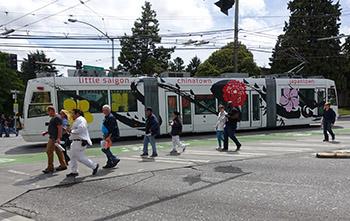
As the initial phase of Yesler redevelopment got underway, the Seattle Department of Transportation (SDOT) began to lay tracks and build new infrastructure for a streetcar through the neighborhood to connect residents with the rest of the city and a regional transportation network. The line, known as the First Hill Streetcar, has been in operation since early 2016. There is a station located directly in front of the Yesler Community Center, where visitors to Yesler can disembark and residents can hop on and ride to other neighborhoods and services, employment centers, Link light rail stations and other transit hubs.
Pedestrian Pathway

Several sections have been completed of what will be a continuous Pedestrian Pathway through Yesler connecting Yesler residents and the surrounding neighborhoods. The pathway runs diagonally through the community between the Little Saigon neighborhood to the south and Harborview Medical Center to the north. It incorporates the Yesler Hillclimb, and passes near Yesler Terrace Park, the Yesler Community Center, streetcar stop, and Epstein Opportunity Center. It will connect with the Green Street Loop and several residential buildings will open onto the Pedestrian Pathway, making it easy for residents to move about the community and interact with each other.
The Pedestrian Pathway, together with the Yesler Hillclimb, is designed to allow wheelchair users and others with accessibility issues to easily navigate through the neighborhood.
Washington Hall
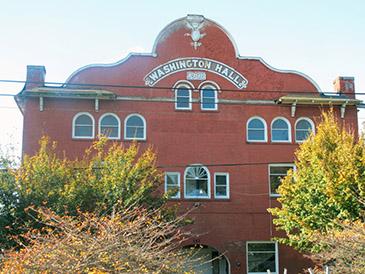
Washington Hall, built in 1908, is located in the eastern part of the Yesler Terrace Redevelopment Area. The historic building has hosted musicians such as Marian Anderson, Mahalia Jackson, Billie Holiday, Duke Ellington, Count Basie, and Jimi Hendrix, and speakers such as W.E.B. du Bois, Marcus Garvey and Joe Louis. In its storied past, the building has been home to a public dance hall and at least one church congregation. It has served as an avant-garde performance arts space and a popular gathering place for the local community.
Over the last few decades, the building fell into disrepair and was in danger of demolition until it was purchased by Historic Seattle, a public development authority and charitable foundation dedicated to historic preservation.
When Historic Seattle mounted a capital campaign to bring Washington Hall back as a regional cultural institution, the Seattle Housing Authority contributed funds to help ensure that this important performing arts center and community meeting space remains one of the Yesler neighborhood’s anchor institutions.
Yesler Hillclimb
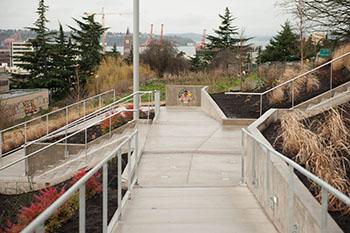
The Yesler Hillclimb is an outdoor pedestrian thoroughfare that connects the neighborhoods of First Hill, Yesler, Chinatown-International District and Little Saigon. It was created by the Seattle Housing Authority (SHA) as part of the redevelopment of Yesler Terrace. The 10th Ave S Hillclimb is open for all residents, neighbors and the public to enjoy.
This pathway along 10th Ave S from S Main Street to S Jackson Street provides a means for people who live and work in the area to travel on-foot to a wide array of businesses, transit options, cultural amenities, recreational sites and social services that exist within the adjacent neighborhoods. It is also a destination in itself, featuring beautiful mosaic medallions along the route and south-facing views of Mt. Rainier and Elliott Bay.
Hillclimb features:
• Staircase
• Wheelchair accessible ramp
• 24-hour low-glare lighting
• Gathering plaza
• 25 colorful glass mosaic medallions
• A runnel to easily push bicycles up the staircase
• Lush landscaping
• Seating at various levels
The Hillclimb displays beautiful mosaic medallions along the route, created by artist Mauricio Robalino, who engaged Yesler neighbors in design concepts that represent the past, present and future of Yesler. In every medallion a raven is present in the scene. The 25 medallions depict the raven’s observations as it flies through the neighborhood, observing the people, landscape, animals, and the transformation of the neighborhood. Robalino incorporated more than 100 glass mosaic pieces created by community member art workshops.
Cyclists can use the Hillclimb’s “bike runnel” to conquer the steep slope, connecting to and from designated bike paths on Yesler Way, Broadway and South Jackson Street.
Yesler Terrace Park
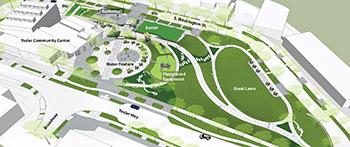
A new 1.8-acre Yesler Terrace Park located directly adjacent to the Yesler Community Center in the heart of the neighborhood was completed in the summer of 2018. The spacious park, with views of Mount Rainier, Puget Sound, Elliott Bay and the Olympic Mountains, provides play spaces, an area for fairs and markets, a soccer arena, paths and seating for strolling and community gathering, and a great lawn for sports, exercise, picnics and concerts.
The Seattle Housing Authority completed preparatory site work and transferred the site to the City of Seattle in late 2016. The Seattle Department of Parks and Recreation now manages the operations of Yesler Terrace Park. Those interested in scheduling special activities in the park may contact the Department directly.
Community Gardening
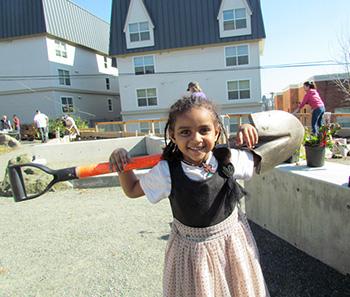
When redevelopment is complete, Yesler will feature about an acre of community gardening, nearly 300 plots, located throughout the neighborhood. Community garden spaces feature storage sheds, water, hoses and plots for residents to grow food for their own use or for sharing. The gardens promote healthy eating as well as exercise and healthy interaction among neighbors.
Horiuchi Park, located on the east side of Boren Avenue north of Yesler Way, is named after Northwest artist Paul Horiuchi. As part of the Yesler redevelopment project, the formerly isolated and little used area was transformed into a 29-plot community garden. The design for the garden, the first to open as part of the redevelopment of Yesler, pays tribute to Horiuchi’s unique artistic style of using patterned collage. Horiuchi (1906 – 1999) was born in Oishi, Japan and travelled to the United States in 1917. A longtime Seattle resident, Horiuchi was a versatile and talented runner and baseball player, polyglot fluent in Japanese, English and Spanish, father, husband and artist.
The community gardening program at Yesler is managed by the Seattle Department of Neighborhoods P-Patch Community Gardening Program. Residents interested in signing up for a plot may contact the P-Patch program directly.
Green Street Loop
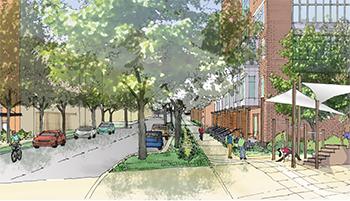
A park-like walkway will parallel Yesler streets in a half-mile loop around the neighborhood. The loop will feature greenery and trees, exercise stations, artwork and seating areas. The loop runs along S Washington Street, 10th Avenue S, Fir Street and 8th Avenue, encircling Yesler Park, Yesler Community Center, the Epstein Opportunity Center and several residential buildings. It will also connect several pocket parks in the community. The Green Street Loop provides additional attractive open space and encourages walking and other forms of exercise.
Yesler Community Center
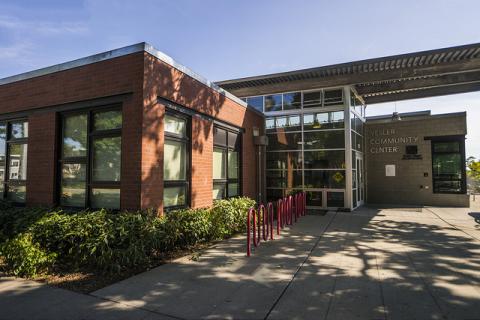
The Yesler Community Center, located in the heart of the neighborhood, serves people from a multitude of world cultures. The center draws not only from the Yesler neighborhood but also attracts residents and workers from First Hill, Pioneer Square, the Central District, the International District and downtown Seattle.
The current center, which was constructed to replace an older, existing one, opened in 2004. The environmentally sustainable center has an open lobby with displays of photography and other art by neighborhood youth. Other interior spaces include two multipurpose rooms with a commercial-grade kitchen, an arts and crafts room, other smaller rooms and a gym with a regulation-size basketball court.
The variety and sizes of the rooms provide spaces for an array of programs, activities and special events, catering to the needs of the community. The center hosts annual events such as Juneteenth and a Mother's Day Brunch, while offering regular programs for toddlers (indoor gym), youth (basketball, badminton, volleyball and other sports), adults (dance, martial arts) and seniors (pickleball). The Yesler Community Center is operated by the Seattle Department of Parks and Recreation. For schedules, questions and programming, contact the Yesler Community Center directly.
